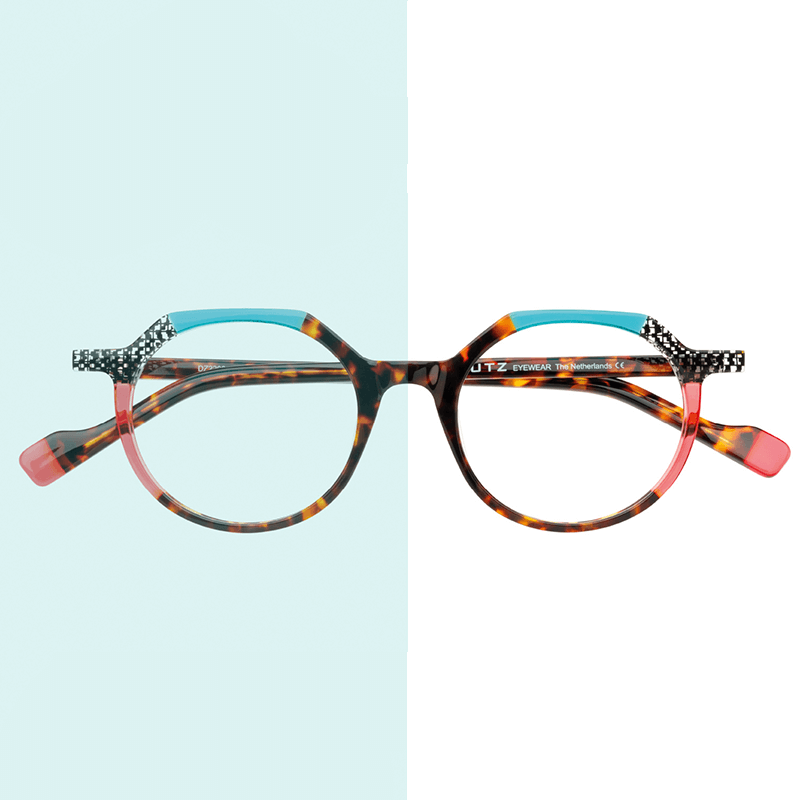Blue Light
Our eyes are not efficient at blocking blue light that comes out of digital devices. Unlike other types of light, visible blue light can pass through the eye’s cornea and lens and directly reach the retina. As it has a very short wavelength, it produces a higher amount of energy, creating flickering, glare and visual “noise”. Tired, irritated eyes, blurry vision and light sensitivity are just some of the symptoms which can be exacerbated by excessive blue light. Blue light exposure may also increase the risk of macular degeneration and other eye diseases.
In the retinal layer, at the back of our eyes, exist both cone and rod photoreceptor cells that are responsible for light sensitivity. Recent and ongoing research has shown that there is a third type of retinal photoreceptor which is sensitive to blue light. These sparsely-situated blue-light receptors help differentiate between day and night, regulating our “sleep/wake” cycles known as circadian rhythms and our pupil responses. The blue light from your screens may be interfering with your body’s sleep-inducing hormone melatonin. Disruption to your circadian rhythm cycle can occur with over-exposure to blue light at night, resulting in difficulty falling asleep and a disrupted sleep pattern.
Blue Light protection for your eyes
Our quality prescription lenses from leading manufacturers are available with the latest technology in blue light filters. We also stock our own design of blue-light blockers that can easily fit over any glasses or worn as is – they are also available through our online shop.
Let the sun shine in
Scientific research has shown that sunlight has a biological effect on our body. It assists in various non-visual functions in the body such as vitamin D production, release of the “happy hormone” serotonin, our mood, hormonal balance and general and visual health. Exposure to bright sunlight during the day regulates how we feel, our reaction time, alertness, cognitive function and energy levels.
Consider that the sun was our major source of light in the past, with people spending their evenings in relative darkness. Over the last 100 years however, due to the invention and prolific use of the light bulb, and much more recently the introduction of digital devices, we are exposed to significantly more light at night. Prolonged exposure to light in the evening delays our body clock, leading us to delay our bedtime. Light is the most important factor that can affect your sleep.
Blue light exposed
Nowadays aside from those of us who use screens at work, it is common to come home after a long day at work or school and relax by surfing the internet or catching up on social media on our phones, laptops and tablets. The light from these digital devices have a much higher concentration of blue light compared to natural light. Scientists have warned against using light-emitting devices before going to sleep as this intense blue-light exposure is disturbing our body’s rhythm and sleep patterns.
Blue light affects levels of the sleep-inducing hormone melatonin more than any other wavelength. Melatonin is created by the pineal gland in the brain during darkness and this production stops during daylight. It is profoundly affected by light and darkness. Melatonin helps regulate other hormones whilst controlling the body’s circadian rhythm, an internal 24-hour “clock” that plays a significant role in when we fall asleep and when we wake up.
Shifting the body’s natural clock with blue light exposure at night can have a negative impact on health and has been implicated in depression, cancer, diabetes, immune problems, obesity and heart disease. Visual comfort and eye health are also affected, with an increased risk for retinal cell damage leading to macular degeneration.
Who is more at risk?
We all need protection from blue light exposure at night but some people are more vulnerable to its negative effects:
- Office workers in front of computers all day, with high exposure to fluorescent tubes and LED lights and minimal sunlight exposure
- Teenagers and children who use digital devices late at night for study and personal use – they may have trouble getting to sleep, waking up easily and issues with mood
- Shift workers – studies have linked working night shifts, and subsequent exposure to light and blue light, to several types of cancer (breast, prostate), diabetes, heart disease and obesity
- Those more at risk for macular degeneration including family history, smokers, those with cardiovascular issues, diabetes, poor diet
- Those with intra-ocular lenses who have had cataracts removed – exposed to more blue light penetration through to the retina
Tips for better sleep and health
- Seek out bright sunshine in the morning to set your body clock, improve your mood and increase alertness (get up early!)
- Expose yourself to bright natural light during the day – take your lunch breaks outdoors, go for a walk!
- Sunglasses may limit your eyes’ access to full sunlight. Go shades-free in the daylight, even for 15-20 minutes a day
- Have lots of breaks away from your digital screens. Set an alarm on your phone to break for 30 secs every 30 mins! Turn your screen brightness down and position screens and smart phones further away from your eyes
- Lens companies now offer blue-light-blocking technology on spectacle lenses. These specialised coatings on lenses reduce blue light and are being recommended for close screen use.
- Avoid using digital devices two to three hours before bed
- Install an app that reduces blue light at night on your laptop and smartphone eg. f.lux and Twilight. I-Phone users now have a blue-light reduction feature called Night Shift
- Use 100% blue-blocking glasses in the evening, especially if using digital devices. Wear these glasses continuously for 2-3 hours before your ideal bedtime – with all TV viewing, computer, tablet, e-reader an smartphone usage. Remove these only after all lights have been switched off and you’re in bed! We have been using these glasses for the last year in the practice and have had great feedback about improvements in getting to sleep and quality of sleep!
- Dim general lighting in the evening
- When you feel sleepy, go to bed – listen to your body!
- Sleep in complete darkness (avoid smart phones, night lights and alarm clocks in the bedroom)
Digital Eyestrain
Digital devices are great in many ways – they help us work smarter but they’re making our eyes work so much harder. With many Australians spending up to 10 hours per day using digital devices, significant eye strain and discomfort can result. Most of us use mobile phones, iPads, computers and laptops.
Symptoms we experience after prolonged screen time can include:
- Loss of focus
- Burning, tired, red, sore, watery or dry eyes
- Double vision
- Eye twitching
- Headaches
- Neck and shoulder pain and tightness
- Dry Eyes
What causes digital eye strain?
Words and images on a screen are created by combinations of tiny points of light (pixels), which are brightest at the centre and then reduce in intensity toward their edges. This challenges our eyes to maintain their focus, in addition to the challenge of focusing close-up for long periods of time. We also tend to blink less, which means that our eyes may not receiving sufficient lubrication to do their job well.
We can help you prevent digital eye strain
A pair of glasses designed specifically for digital device use will relax and protect your eyes as you undertake many visual tasks with different screens at different distances. At Premier Eyecare we have an interest and understanding in the impact of digital devices on our vision. We take a special interest in new lens technology, specialised coatings and filters for your lenses.
We recommend lenses from our quality manufacturers to help you read text more easily and also enable your vision to cope with visual demands. By adding anti-glare and a blue light filter to your lenses, the potentially damaging effect of blue light from devices is reduced, also providing even greater comfort to your eyes. Talk to us at Premier Eye Care about an individually-tailored vision solution to alleviate the symptoms of digital eye strain.

